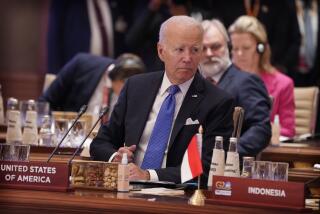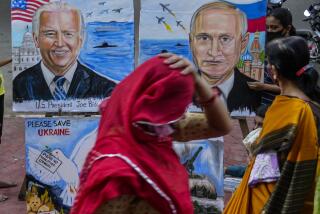. . . And Pakistan Must Be Dissuaded
- Share via
India’s defiant nuclear tests have already triggered a wide range of American trade and aid sanctions that are mandatory under U.S. law. While President Clinton had virtually no leeway in imposing these sanctions, he is now faced with the far more difficult task of crafting a revised South Asia policy.
This policy must attempt both to register sharp disapproval of India for its behavior and dissuade Pakistan from conducting its own tests, which would exacerbate already strong Indo-Pak tensions and accelerate a regional arms race that could spiral out of control.
The Clinton administration’s immediate objective must be to ensure that India is not rewarded for its actions. Working bilaterally and through multilateral agencies, the U.S. should enlist the support of the international community to disabuse India of its perverse perception that its now open nuclear capability will confer great-power status and generate global respect. On the contrary, the White House needs to send the strongest possible signal that helping to develop and adhere to international norms, not flouting them, defines world-class players. If the White House is to achieve its corollary objective of diffusing an Indo-Pak arms race and reducing regional tensions, this message must apply equally to Pakistan as to India.
The president should:.
* Immediately cancel his planned trip to India in November and make clear to Pakistan that the same conditions will apply. If nonproliferation is really one of the cornerstones of his foreign policy, how can the president do otherwise?
* Consider some form of security guarantees for Pakistan in the event of a nuclear attack by India, provided Pakistan refrains from nuclear testing.
* Exact a firm pledge from Japan, the source of one-half of India’s foreign assistance, that it will indefinitely suspend loans in addition to grant aid.
* Jawbone his G-7 colleagues to take tough, not cosmetic, collective steps against India. Realistically, we cannot expect our partners to agree to mirror the U.S. sanctions. But, at a minimum, we should seek agreement to cut off all World Bank lending to India, projected at $3 billion this year, and to suspend official credit and guarantee programs.
* Redouble existing efforts to ensure that Russia, which has already stated that it will not participate in any trade or aid sanctions, to cancel plans to sell India two nuclear power plants.
* Consult with Congress on possible additional sanctions against India, in addition to reaching agreement with leaders on Capitol Hill on minimum conditions for new legislation necessary to lift India sanctions now in place. This legislation, of course, hinges on India taking positive measures to extricate itself from its self-imposed global isolation.
India’s first step must be to accede, without conditions or reservations, to the Comprehensive Test Ban Treaty as a nonnuclear power. In attempting to justify its series of nuclear tests this week, the Indian government pointed to security threats posed by Pakistan and China. The former is, as was India until this week, a “nondeclared” nuclear state; the latter is a nuclear power that signed the CTBT two months after conducting final nuclear tests in 1996. India, like China, should sign the CTBT within two months of its tests. This, in turn, could lead to Pakistan’s agreement to sign.
India can launch the reconstruction of its international reputation by being more forthright in its diplomatic dialogues, especially with its putative friends such as the U.S. Weeks of preparation are necessary to conduct nuclear tests like the five that took place this week in India. Yet when Bill Richardson, the U.S. representative to the U.N., visited New Delhi last month as the president’s special envoy, he was given no indication that tests were in the offing. Even worse, the Indian Foreign Secretary reportedly told senior U.S. officials on May 1 that there would be “no surprises” before the president’s planned trip to South Asia. Ten days later, this same Indian official served as his country’s spokesman following the first three tests.
Although the United States, for its part, should devote more attention and personnel resources to South Asia, it should concentrate for now on spearheading a vigorous international response to India’s misbehavior. Only a coordinated, multilateral approach with teeth will have the desired impact of sending India and would-be proliferators an unequivocal message.
In pursuing its nuclear tests, India made a conscious choice to thumb its nose at international norms. With one-fifth of the world’s population, an India that is isolated is not in the long-term interest either of the United States or the larger global community. Nevertheless, it is India that must now choose whether it will move decisively to rejoin the global community or consign itself to the role of the world’s most dangerous democracy.
More to Read
Get the L.A. Times Politics newsletter
Deeply reported insights into legislation, politics and policy from Sacramento, Washington and beyond. In your inbox twice per week.
You may occasionally receive promotional content from the Los Angeles Times.










